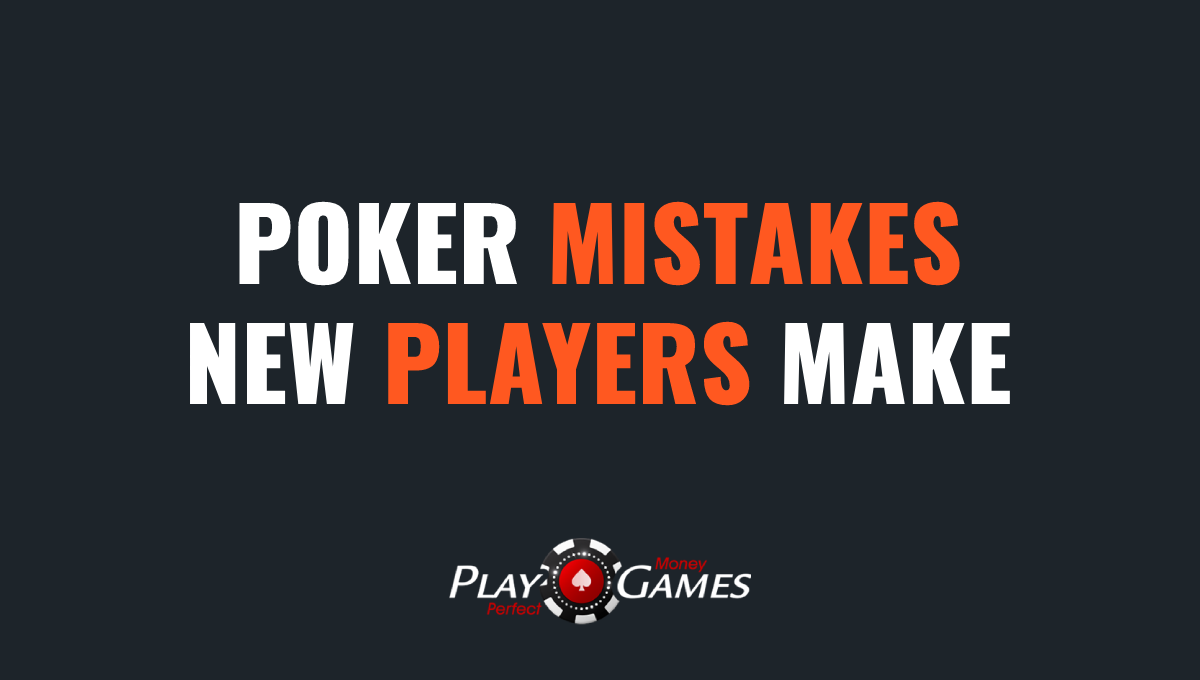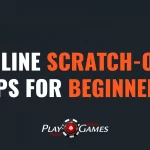Poker Mistakes: 7 Things New Players Should Fix to Take Their Game to a Higher Level
Learn the most common mistakes new poker players make and how to avoid them. Improve your game with expert tips from Play Perfect Money Games.
For those of you new to the world of poker and the tremendous phenomenon that the game is, there are some critical points that you need to bear in mind before you dive in completely. Because poker can be very euphoric, one needs to be mindful of the fact that there are severe traps that can make all beginners lose their cool. Along the way, if you notice the mistakes, you can continue to refine and improve your poker skills even more.
Picture actively engaging in a poker game, experiencing the rush of competition. However, an impulsive move leaves you puzzled about what went awry. More often than not, novice players fall prey to frequent mistakes that pervade amateur poker. Therefore, let’s have a thoughtful discussion about errors to circumvent as you progress in your poker journey. The following tips may aid in reinforcing your approach to elevate your performance over time.
Mistake #1: Lack of Patience and Discipline
For those new to poker, patience, and discipline are foundational yet often overlooked virtues crucial for success. While the thrill of poker entices many, impulsive decisions rarely yield positive outcomes. Beyond being important at the table, cultivating these qualities can profoundly benefit all areas of life.
At the poker table, patience goes beyond waiting for optimal cards – it involves maintaining composure amid volatility without impulsive reactions. Effective poker requires judicious timing of actions, even when the temptation to act prematurely emerges. Patience allows focused composure through adversity. Developing patience involves mindfulness techniques to promote calm assessment under pressure. Setting pragmatic expectations can prevent frustration from unexpected outcomes.
Discipline separates accomplished from novice poker players. It compels rational, strategic choices over emotional reactions. Discipline facilitates optimal decision-making, whether folding marginal holdings or boldly raising stakes. Developing discipline begins with establishing routines, from dedicated study schedules to disciplined bankroll management and restful sleep habits.
Remarkably, cultivating patience and discipline extends far beyond poker. These virtues prove invaluable for navigating life’s challenges with grace and drive. Patience aids in resilience through complexity, while discipline fosters focus and motivation in pursuit of dreams. When frustration tempts straying from goals, remembering poker’s lessons taps into the transformative power of patience and discipline. Trustingly, these virtues continuously benefit all arenas of existence. For poker players and beyond, cultivating patience and discipline rewards enduring growth.
Mistake #2: Getting Too Emotional While Playing
While naturally experiencing an array of emotions playing poker, relinquishing control invites detriment. Losing objectivity due to feelings is termed “going on tilt.” Whether thrill after wins or frustration from setbacks, clouded judgment compromises play. Many beginning players succumb to emotional volatility.
Tilting manifests differently. One might chase losses rashly, increasing danger. Or fear paralysis could stall, missing chances. Regardless of form, emotion-driven actions sabotage success. However, maintaining composure remains possible.
Mindfulness techniques like deep breathing center attention beneficially. Stepping away briefly resets perspective helpfully. Even short breaks dissipate burnout, restoring balance.
Most significantly, remembering poker involves fun and betterment, not stress. As a leisure activity, maintaining enjoyment and curiosity optimizes the experience rather than tension.
While naturally experiencing emotional playing, relinquishing control invites detriment. Practicing mindfulness, taking breaks restoring perspective, and keeping enjoyment the priority allows managing feelings productively. In those swept by momentary passion, a deep breath remembers – it remains just a game. By retaining objectivity amidst volatility, one can experience poker fruitfully.
Mistake #3: Overplaying Speculative and Medium-Strength Hands:
Beginning poker players often become overenthusiastic about decent starting hands, risking detriment. Not all holdings warrant equivalent investment due to varying potential. Focusing on objective strength assessment and strategic implications optimizes play.
Consider a hand with prospects yet limited present power, like a suited connector or small pair. Such speculative holdings offer excitement but overplaying them invites frequent error. While flush or straight draws may develop, heavy betting disproportionate to present strength constitutes overvaluing a hand.
Speculative hands inherently carry greater risk than superior holdings like premium pairs affording a high probability of triumph. Unlike premium holdings, speculative hands rely heavily on fortuitous community cards to progress. However, potential alone doesn’t warrant all-in wagering; poker involves calculated risk acceptance.
To avoid costly overplaying, disciplined evaluation, and prudent decision-making are paramount. Rather than enticing potential large payouts, objectively consider positional nuances, pot size implication, and opponent behaviors to guide proceeding prudently. If probabilities aren’t favorable or prospective reward is insufficient, preserve resources by dropping despite speculative potential.
While such hands add enjoyment, overplaying them often proves detrimental in the long run. By thoughtfully assessing relative strength and dynamically incorporating situational stakes, disciplined players stack the statistical odds favorably through informed adjudication of risk-versus-reward. Beginning players especially benefit from avoiding this common pitfall by maintaining a studied perspective.
Mistake #4: Ignoring Position and Table Dynamics
Table position and dynamics significantly impact results, necessitating astute consideration. “Position” denotes one’s seating relative to the dealer button, conferring strategic implications. Players sooner see others’ actions with a “late position” advantage, insightfully responding. Meanwhile, “early position” requires prudent restrictions with limited information.
However, even from early slots, comprehending tendencies allows profitable plays. “Table dynamics” involve discerning a game’s atmosphere – tight or loose, cautious or daring. Adjusting strategy appropriately optimizes outcomes. For example, a conservatively folded table invites modestly widened starting hand criteria, capitalizing on passivity. Conversely, loose tables demand tighter adherence to premium holdings, mitigating superfluous risk-taking.
Therefore, attentiveness to nuanced positional variances and circumstantial flux optimizes decision-making aptitude. Judicious exploitation of informational asymmetries and situational proclivities stacked statistical probabilities favorably. For poker neophytes especially, enriched cognizance of these pivotal considerations markedly strengthens gameplay through informed strategic calibration. Position and flow induce neither paralyzing inhibitions nor compulsive actions, but prudent opportunism – a prudent player’s prudent guide.
Mistake #5: Inflexible Strategy
While a thoroughly studied strategic framework proves invaluable, rigidity therein poses problems. No strategy ensures perpetual success given poker’s dynamic nature. Careful precept comprehension instead of rote memorization fosters flexibility.
Inflexible strategies manifest, for example, through reliance on singular playing styles disregarding ineffectiveness. Or fixed-range assumptions irrespective of positional nuances and opponents’ tendencies. However, profitability varies contextually, necessitating open-minded adjustment.
Poker demands constant adaptation, as circumstances evolve. Formerly prosperous tactics falter beyond initial situations. Opponents likewise modify, frustrating static strategies. Therefore, attentiveness to table undercurrents optimizes strategic reassessment.
Paying close attention to opponents’ behaviors and calibrating accordingly proves prudent. Against aggressive players, for example, tightening ranges preemptively safeguard holdings. Conversely, loose players invite wider exploration of stealing and trapping opportunities through perceptive discernment of proclivities.
Rigidity curtails potential, while adaptability strengthens acumen. Comprehensively grasping strategic nuances, rather than rigid adherence to formulas, cultivates proficiency across fluctuating conditions. Success stems from discerning optimal lines amid flux, not inflexible predetermination. Poker flourishes through flexibility – an evolving strategic sensibility guiding optimal recalibration affords enduring supremacy.
Mistake #6: Failure to Manage Bankroll Effectively
Novice poker players often misunderstand the necessity of judicious bankroll governance for long-term achievement. Beyond skill and fortune, prudent capital stewardship proves pivotal. Premature high-stakes entrance amidst inexperience portends inevitable depletion.
Wise poker involves discreet allocation separate from general finances, viewed as an educational investment. Prudent limits constrain single-session or tournament risk typically to 5% of total reserves, forestalling ruinous downswings. Fluctuations occur naturally; conservative wagering ensures continued participation.
Succeeding demands close tracking and evaluative adaptation. Win-streaks invite elevated limits engagement whereas downturns necessitate temporary regression to rebuild reserves. Ongoing reassessment accompanies developing prowess.
Methodical accumulation outweighs the desperate capture of fancied scores. Steady accumulation and protective protocols stabilize the monetary platform whereby players optimally refine their craft. Continuous monitoring and flexibility fortify the financial framework supporting long-term poker immersion.
Adhering to strategic bankroll management undoubtedly strengthens any player, from fledgling to master. While chance influences results, diligent capital governance maximizes positive expectancy. For those determined to fulfill poker’s potential for skill and reward, prudent administration affords that opportunity. Success stems from a meticulously sustained economic framework, guiding the optimization of time and talent invested in this entertaining pastime.
Mistake #7: Failure to Keep Learning
Fellow poker enthusiasts should grasp that mastery arises from ceaseless refinement, not presuming competence consummates upon novice fundamentals. In poker’s perpetually evolving landscape, stasis invites regression against dynamic adversaries.
While introductory comprehension establishes confidence, proliferation necessitates continual fortification and prevention of strategic obsolescence. Strategies today fail tomorrow without proactive recalibration; complacency stunts growth.
Making education routine reinvigorates perspective. Whether scholarly material, instructional media, or collegial exchange, abundant resources invigorate conceptual latitude. Outside rating likewise illuminates previously indistinct tactical subtleties demanding remedy.
Moreover, immersive practice provides experimentation fueling progress. Beyond automatic execution, goal-oriented sessions cultivate targeted skillsets and incipient propensities. Testing hypotheses and synthesizing feedback fortifies the scientific spirit vitalizing advancement.
In conclusion, a growth orientation forestalls stagnation amidst poker’s fluid nature. Perpetual enrichment through study, critique, and application maintains momentum superseding plateaus. For those committed to the quest for constant betterment, complacency finds no home. The journey continues.
Overcoming Obstacles on the Path to Poker Proficiency
Learning the basic mistakes usually experienced by new gamers is the most useful thing they can do at the start of their gaming journey. Though chance is an ingrained part of poker, developing your mental muscles through careful decision-making increases the chances of favorable long-term returns. Don’t jump too early into risk-taking, be as objective as possible in volatile situations, and make sure your fundamentals are flawless – these three precautions will eventually ensure you become an expert player, no more a beginner.
The fun in poker comes from its element of applying intelligence and wit against opponents. Constantly trying to gain a better understanding of the intricacies of tactics and how they differ in specific situations improves skills. Online gaming platforms such as Perfect Money Games are arenas where poker students get the opportunity to put theories they have acquired into practice. Poker variations, including 357 Poker, Jacks or Better, and Multi-Strike Poker provide infinite levels of fun for our guests and opportunities to tweak hand strength recognition and bankroll management among other skills.
For us, what counts is that people who are brave enough and dedicated to the task of self-improvement through our site will continue to practice and rethink previous challenges over and over again until they surmount them all. Never mind the cards you are dealt, the situation you are in, or the hardship you face, the aware and vigilant player always continues moving forward on their journey to mastery. So, what are you waiting for? Shuffle up and deal!


